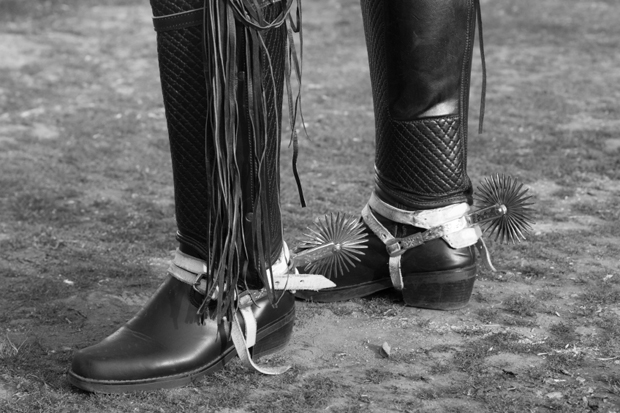‘Anything becomes interesting if you look at it long enough,’ said Gustave Flaubert. He might have been talking about this slim volume, which takes a slimmer subject and inflates it to an epic of noble proportions.
The subject is unpromising. ‘This is the story of a man who took part in a dance contest,’ runs the opening line. It’s hardly one to set many hearts racing, especially since the event in question is no glitzy Strictly Come Dancing, screened on television for millions. Instead, Leila Guerriero’s focus is the world championships in malambo, an obscure Argentinian dance, whose annual apogee takes place in Laborde, a town of 6,000 inhabitants in the middle of the flat, fertile pampas.
There is nothing much there except fields of corn or soya and a ramshackle stage where the contest is held. The unique quality of the event lies partly in the dance itself, ‘a joust for men who take turns to dance to music’. They aspire to gaucho virtues of courage, sincerity and pride, and perform in the traditional dress of the gaucho, their feet bleeding due to the intricacy and intensity of the steps, unable to breathe because the exertion is so great. As Guerriero explains:
The fastest 100-metre runners in the world aim for sub-ten-second times; Usain Bolt’s record stands, at the time of writing, at 9.58 seconds. A malambo dancer in full flow moves his feet just as quickly as a 100-metre runner, only he has to keep it up for five minutes.
What fascinates Guarriero is that, in order to preserve the prestige of the world championship, the moment a man becomes senior champion — a feat that may have taken him a lifetime of practice to achieve — he must instantly retire from dancing. He becomes ‘a man who is crowned and destroyed in the same instant’.
It’s this that takes her to Laborde in January 2011, to try to uncover the motivation of men who are ‘fighting their way to the top only to come straight back down again’. But then she meets the man who will become the hero of her tale: 28-year-old Rodolfo González Alcántara. When she first sees him dance, it is like a coup de foudre. ‘The night became a thing he pounded with his fist,’ she writes.
At the end, he stamped his foot with terrific force and stood, covered in stars, resplendent, staring through the peeling layers of the night air. And with a sidelong smile — like that of a prince, a vagabond, or a demon — he touched the brim of his hat. And was gone.
She rushes backstage, expecting to find a giant and instead discovers an unusually short, shy man, humble and devoted to both his family and his dancing. From that moment her simple story becomes a more complicated one, as she follows his preparations for the following year’s contest and begins to understand the levels of dedication that malambo demands. Faced with Alcántara’s poverty — the kind where there is no money for bus tickets and so little food that his wife cries with hunger — she confronts other questions too:
Are we interested in reading stories like Rodolfo’s? About people who believe that family is a good thing, that kindness exists, that God is real? Are we interested in the kind of poverty that isn’t extreme misery, when it doesn’t go hand in hand with violence, when it’s free from the brutality we love to see and read about.
By the end of 149 pages, the answer has to be ‘yes’. Although the style is spare and although Guerriero occasionally overreaches herself in trying to describe the magnificence of the performances she is witnessing (‘The first movement he made with his legs ruffled his cribo trousers like some delicate underwater creature’), she is a mistress of the telling phrase or the revealing detail. As the audience awaits the performance she says: ‘The silence is total, as if there’s been a sudden snowfall.’ When Alcántara nervously prepares in the bare dressing room backstage, ‘he sits down, though his limbs continue to move’.
Through patient observation, she builds a picture of this man, and the lost world he inhabits, where the glory of winning a contest known only to a few is more important than widespread fame, and where the power of a dance lies not just in its technique, but in its overwhelming spirit. It is worth looking at for a long time. And very interesting.
Got something to add? Join the discussion and comment below.
Get 10 issues for just $10
Subscribe to The Spectator Australia today for the next 10 magazine issues, plus full online access, for just $10.
Available from the Spectator Bookshop, £8.50, Tel: 08430 600033
You might disagree with half of it, but you’ll enjoy reading all of it. Try your first month for free, then just $2 a week for the remainder of your first year.














Comments
Don't miss out
Join the conversation with other Spectator Australia readers. Subscribe to leave a comment.
SUBSCRIBEAlready a subscriber? Log in